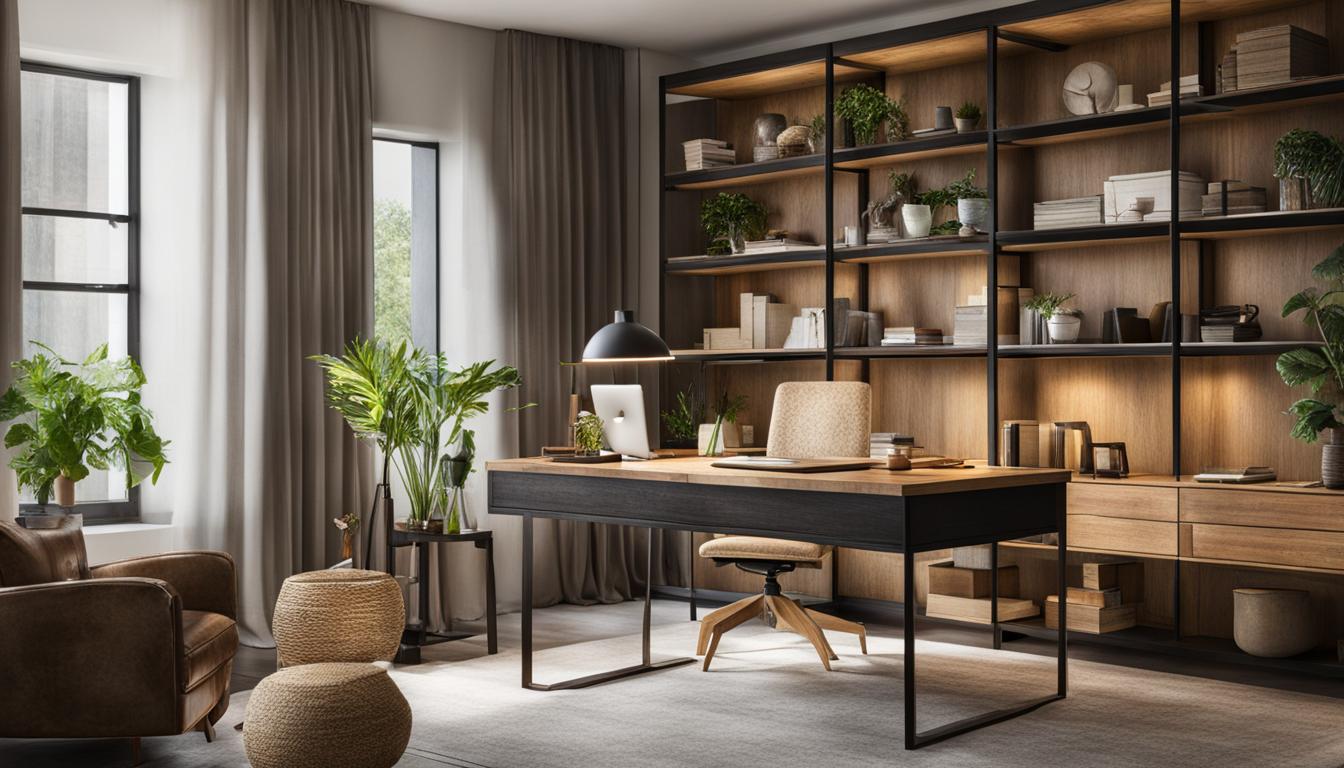If you’re looking to boost productivity, creativity, and overall well-being in your office, then it’s time to embrace the ancient art of Feng Shui. This Chinese practice involves arranging your physical environment in a way that promotes positive energy flow and balance.
Implementing these principles in your office can help reduce stress, improve focus, and even boost your bottom line. Whether you work in a traditional office or a home workspace, these Feng Shui tips can help you achieve harmony and balance in your environment.
Key Takeaways:
- Feng Shui principles can enhance productivity, creativity, and well-being in your office.
- Decluttering and organizing your workspace is crucial for creating better energy flow.
- The placement of furniture, equipment, and color can have a significant impact on the office environment.
- Incorporating natural elements such as plants and natural light can improve energy and atmosphere.
- A balance between yin and yang energy is crucial for achieving harmony in your office.
Understanding Feng Shui: Enhancing Your Workspace
In the previous section, we learned about the concept of Feng Shui and why it is essential for creating a harmonious and productive office environment. Now, let’s dive deeper into the principles of Feng Shui and how it can enhance productivity, creativity, and overall well-being in your workspace.
Feng Shui is more than just arranging furniture; it is about understanding the flow of energy or “chi” throughout the space. To enhance productivity and well-being, it is essential to create a positive office environment with good Feng Shui.
One of the most crucial aspects of Feng Shui for productivity is office organization. A clean, clutter-free workspace promotes a clear mind and makes it easier to focus on work. Make sure to clear out any unnecessary items from your desk and surrounding areas to create an open and inviting workspace. You can also consider using office storage solutions, such as filing cabinets or bookshelves, to keep your workspace organized and reduce clutter.
Another important aspect of Feng Shui for creating a positive office environment is the placement of furniture. Ensure that the layout of your office allows for an easy flow of energy. Avoid placing your desk in a direct line with the door, as this can cause energy to rush by and create distractions. Instead, position your desk to face the door diagonally and place a mirror on the wall opposite your desk to reflect the view of the entrance. This will help you feel more in control and grounded while working.
Additionally, incorporating natural elements such as plants and natural light can help boost energy in your office. Plants can purify the air and add vitality to your workspace, while natural light can improve mood and productivity levels. Consider adding a plant or two to your workspace and allowing as much natural light in as possible.
By understanding and implementing the principles of Feng Shui in your workspace, you can create a positive environment that promotes productivity, creativity, and well-being.

Clearing the Clutter: Organizing Your Office for Success
As you may have heard, a cluttered workspace leads to a cluttered mind. This is because a disorganized office can create a stressful and chaotic environment that can negatively impact your productivity and overall well-being. Therefore, one of the first steps to improving your office with Feng Shui is to declutter, organize, and optimize your workspace.
To organize your office with Feng Shui principles, it’s important to start by assessing your current layout. Take a look around your office and see whether the arrangement of your furniture and equipment is conducive to a productive and harmonious environment. If not, it’s time to make some changes.
Office Layout Feng Shui Tips
Here are some Feng Shui tips to help you optimize your office layout:

| Feng Shui Tips for Your Office Layout | Explanation |
|---|---|
| Clear the Clutter | The first step in organizing your office is to remove anything that doesn’t serve a functional or aesthetic purpose. Get rid of old files, papers, and equipment that are no longer needed. |
| Position Your Desk Strategically | Your desk is the most important piece of furniture in your office. Place it in the command position, which means facing the entryway with a solid wall behind you. This position will help you feel in control and aware of your surroundings. |
| Separate Work and Relaxation Areas | If you have a relaxation area in your office, such as a couch or a small kitchen, make sure it’s separated from your work area. This will help you create boundaries between work and personal life. |
| Create a Flow | Make sure there’s enough space for you to move around your office. Arrange furniture in a way that creates a natural flow, allowing you to move from one area to another without feeling blocked or restricted. |
| Use Storage Solutions | Invest in storage solutions that will help you keep everything tidy and easily accessible. Use shelves, cabinets, or file organizers to store your paperwork and other office essentials. Avoid having things piled up on your desk or the floor. |
By following these tips, you can create a more harmonious and organized office that will support your productivity and well-being. Remember that the ultimate goal of Feng Shui is to create a space that feels good and works well for you.
Creating a Harmonious Layout: Arranging Furniture and Equipment
One of the fundamental principles of Feng Shui is creating a balanced and harmonious layout in your office. By arranging your furniture and equipment strategically, you can improve the overall energy flow and promote productivity and well-being.
When designing your office layout, consider the following office layout Feng Shui tips:
- Position your desk in a power position, facing the entrance of the room but not directly in front of the door. This will give you a sense of control over your workspace and allow you to see who enters and exits your office.
- Avoid placing your desk directly in line with the door as the energy flow can be too strong and overwhelming.
- Arrange your desk in a way that allows you to have a clear view of the room. This will increase your sense of security and reduce stress and anxiety.
- Place your computer monitor at eye level and position it so that you have a clear view of the entrance and the room. This will help you stay alert and focused.
- Avoid cluttering your desk with unnecessary items as this can create stagnant energy and reduce productivity. Keep only essential items within reach.
By implementing these office layout Feng Shui tips, you can optimize your workspace for maximum productivity and balance.

In addition to furniture and equipment, color can also play a significant role in your office layout. Learn more about choosing the right colors for your office in the next section.
Harnessing the Power of Colors: Choosing Feng Shui Colors for Your Office
Colors have a powerful impact on our emotions and can significantly affect our productivity and creativity. When it comes to feng shui, choosing the right colors for your office space is essential for creating a positive and harmonious environment.
One of the most important things to consider when selecting feng shui colors for your office is the type of work you do. For example, if you work in a creative field, such as graphic design or writing, you may want to incorporate more vibrant colors like red or orange to promote energy and inspiration. On the other hand, if you work in a more analytical field, like accounting or research, you may want to stick to cooler, more muted colors like blue or green to promote focus and concentration.
Here are some examples of feng shui colors and their associated meanings:
| Color | Meaning |
|---|---|
| Red | Energizing, Passion, Courage |
| Orange | Creativity, Communication, Joy |
| Yellow | Optimism, Intellect, Clarity |
| Green | Growth, Balance, Harmony |
| Blue | Calmness, Communication, Efficiency |
| Purple | Intuition, Spirituality, Luxury |
| White | Purity, Clarity, Freshness |
| Gray | Focus, Intelligence, Wisdom |
When using feng shui colors for your office, it’s important to create a balanced and harmonious color scheme. Avoid using too many bright or bold colors, which can be overwhelming, and instead, use them as accents or in moderation. Additionally, make sure to balance out warm and cool colors to create a sense of harmony and balance in your workspace.

By incorporating the right colors into your office space, you can create a more productive, positive, and inspiring environment.
Inviting Natural Elements: Incorporating Nature into Your Workspace
Adding natural elements to your office space can significantly boost energy levels and improve overall productivity. Below are some Feng Shui office tips to help you incorporate nature into your workspace:
- Plants: Plants are a great way to add life and vibrancy to your office. Not only do they purify the air, but they also add a calming element to your space. Consider adding a small plant to your desk or a larger one in the corner of the room.
- Natural light: Natural light is essential when it comes to creating a positive office environment. Whenever possible, choose a workspace with natural light and keep your blinds or curtains open to let in as much sunlight as possible. If that’s not an option, consider investing in a full-spectrum light bulb to mimic natural light.
- Water: Water is another powerful element that can help balance energy levels, especially when placed in the northern or eastern part of the office. Consider adding a small fountain or fish tank to your office space.
By incorporating these natural elements, you’ll notice a significant difference in the overall energy of your office space. Not only will it help you stay focused and productive, but it will also create a more peaceful and harmonious environment.
Take a look at the image below to see an example of how you can incorporate natural elements into your workspace:

“Nature does not hurry, yet everything is accomplished.” – Lao Tzu
Remember, incorporating natural elements into your workspace is just one of many Feng Shui office tips that can help improve productivity and promote overall well-being. Keep reading to discover more ways to create a harmonious and balanced office environment.
Configuring Your Desk: Optimizing Your Personal Workstation
Now that you have a better understanding of Feng Shui principles, it’s time to apply them to your personal workspace. Your desk is where you spend the majority of your time, so it’s essential to make sure it’s optimized for your productivity and overall well-being.
First, start with the placement of your desk. Ideally, it should be positioned so that you have a solid backing behind you and a clear view of the entrance to your workspace. This allows for a sense of security and control over your surroundings.
Next, consider the organization of your desk. Keep it clutter-free and only have essential items within reach. Use desk organizers to keep everything in its place and avoid storing unnecessary items in drawers or on your desk.

Lighting is another essential consideration for your workstation. Natural light is best, so if possible, position your desk near a window. If natural light is not an option, use a full-spectrum light bulb to mimic natural light.
Finally, consider the placement of your computer equipment. Place your computer monitor at eye level to avoid neck strain, and position your keyboard and mouse in a way that feels comfortable and natural to you.
By optimizing your personal workstation, you can harness the power of Feng Shui to increase your productivity, creativity, and overall job satisfaction.
Creating a Harmonious Layout: Arranging Furniture and Equipment
Arranging your office furniture and equipment in a balanced and harmonious way can create a positive energy flow in your workspace. Here are some feng shui office tips to help you achieve the perfect layout:
Desk Placement:
Place your desk in a power position where you can see the door and have a solid wall behind you. This creates a sense of security and helps you feel in control of your environment. Avoid facing a wall or having your back to the door.

Organize Your Space:
Ensure that your office is organized and clutter-free. This promotes good energy flow and helps you feel focused and productive. Use storage solutions to keep your items in their proper places, and avoid keeping unnecessary items on your desk.
Positioning Furniture:
Arrange your furniture in a way that promotes easy movement and accessibility. For example, position your bookcase away from your desk, so you don’t feel overwhelmed or distracted by the items on the shelves. Place your chair at a 90-degree angle to your desk to create a feeling of openness and flexibility.
Choose the Right Size:
When choosing furniture for your office, ensure that it is the right size for the room. Overlarge furniture can create a cramped and restrictive atmosphere, while undersized furniture can make your office feel disjointed and empty. Request the help of a professional interior designer if you are uncertain about the size and placement of your office furniture.
These feng shui office tips can help optimize your office layout and create a harmonious atmosphere that promotes productivity and well-being. Remember, good feng shui is about creating a space that feels comfortable, balanced, and supportive of your goals.
Enhancing Energy Flow: Using Feng Shui Cures and Remedies
Incorporating Feng Shui cures and remedies into your office space can help balance the energy flow and alleviate specific challenges or imbalances. Here are some practical feng shui office tips to enhance energy flow:
- Crystals: Place a crystal on your desk or in the corners of your office to promote positive energy flow.
- Essential oils: Use essential oils such as lavender or peppermint to improve focus and concentration.
- Mirrors: Hang mirrors in your office to reflect natural light and promote a sense of openness.
- Plants: Incorporate plants into your office to enhance air quality and promote a sense of calm.
- Salt lamps: Place a salt lamp in your office to purify the air and promote a sense of relaxation.
These feng shui office tips are simple yet effective in creating a more harmonious and productive work environment. Try incorporating one or more of these remedies into your office space and notice the positive impact on your energy and focus.

“Incorporating natural elements such as plants, natural light, and water features can improve the energy and overall atmosphere of your office.”
Mindful Work Practices: Cultivating a Positive Office Culture
Creating a positive office environment is essential for fostering productivity, motivation, and a sense of community among employees. Here are some mindful work practices that can help cultivate a positive office culture:
Encourage Open Communication
Encourage open communication among team members by creating a safe and welcoming space where everyone feels heard and valued. Encourage team members to express their ideas and opinions, and actively listen to their feedback to improve team dynamics.

Practice Gratitude
Practice gratitude by expressing appreciation and recognition for your colleagues’ hard work and contributions. This not only boosts morale but also creates a culture of positivity and mutual respect.
Promote Work-Life Balance
Promote work-life balance by encouraging employees to take breaks, prioritize self-care, and set realistic expectations for workloads. This helps reduce stress and burnout, leading to happier and more motivated employees.
Celebrate Achievements
Celebrate achievements, both big and small, to acknowledge and reward individual and team accomplishments. This not only boosts morale but also strengthens a sense of teamwork and camaraderie in the office.
Lead by Example
Finally, lead by example by embodying positive work practices and behaviors yourself. By setting a high standard for professionalism, respect, and collaboration, you can inspire and motivate others to do the same.
Conclusion
Congratulations, now you know how to Feng Shui your office and create a harmonious and productive workspace. Remember, Feng Shui is not a one-time fix, it’s an ongoing process that requires attention and intention. By incorporating the principles of Feng Shui into your office, you can stimulate creativity, reduce stress, and increase focus and productivity.
Start by understanding the basics of Feng Shui and its role in enhancing your workspace. Clear the clutter and organize your office in a way that promotes better energy flow. Use the power of color and natural elements to create a positive and invigorating atmosphere. Optimize your personal workstation and balance yin and yang energies.
Don’t forget to incorporate Feng Shui cures and remedies to address any specific challenges or imbalances in your office. Finally, cultivate a positive office culture by fostering collaboration, gratitude, and mindfulness.
So why wait? Start implementing these tips today and experience the benefits of a harmonious and productive office environment. Good luck and happy Feng Shui-ing!
FAQ
What is Feng Shui?
Feng Shui is an ancient Chinese practice that focuses on creating a harmonious and balanced environment to promote positive energy flow and well-being.
Why is Feng Shui important in the office?
Feng Shui in the office can enhance productivity, creativity, and overall well-being, creating a positive and conducive work environment.
How can I organize my office using Feng Shui?
Decluttering and organizing your office space is essential in Feng Shui. Tips include clearing unnecessary items, organizing files, and creating a designated workspace for maximum efficiency.
What is the ideal office layout for Feng Shui?
The ideal office layout in Feng Shui involves positioning your furniture and equipment in a way that allows for optimal energy flow and supports your work activities.
How can I choose the right colors for my office based on Feng Shui?
In Feng Shui, colors impact energy and mood. Consider using warm colors like yellow or orange for creativity and productivity, while cool colors like blue or green can promote calmness and focus.
How can I incorporate natural elements into my office using Feng Shui?
Adding plants, natural light, and water features can enhance the energy and atmosphere in your office, creating a more vibrant and harmonious work environment.
What are some Feng Shui tips for optimizing my personal workstation?
Feng Shui tips for optimizing your personal workstation include placing your desk in a commanding position, keeping it clutter-free, and arranging essential items for maximum comfort and productivity.
What does it mean to achieve a balance between yin and yang energies in my office?
Yin and yang energies represent feminine and masculine principles in Feng Shui. Balancing these energies in your office space promotes harmony and equilibrium, resulting in a more balanced work environment.
What are some Feng Shui cures and remedies for improving energy flow in the office?
Feng Shui cures and remedies can include placing mirrors to reflect light and energy, using crystals or fountains to activate positive energy, and using aromatherapy with essential oils to promote well-being.
How can I cultivate a positive office culture using Feng Shui?
Foster a positive office culture by encouraging open communication, teamwork, and mutual respect. Incorporating Feng Shui principles can enhance the overall energy and promote a harmonious work environment.

